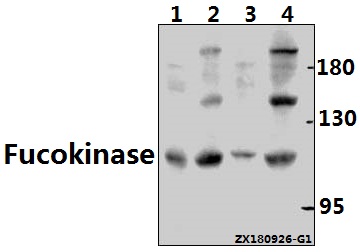Product Name :
FUK (Q26) polyclonal antibody Background :
Blood group antigen recognition, metastasis and inflammation utilize fucose, a sugar found in glycoproteins and glycolipids. Fucokinase, also designated L-fucose kinase or FUK, is a 1,084 amino acid enzyme that plays a role in the salvage pathway of fucose reutilization. A member of the GHMP kinase family, Fucokinase exists as two alternative splice variants and catalyzes L-fucose phosphorylation to form β-L-fucose 1-phosphate. The gene encoding Fucokinase maps to human chromosome 16, which encodes over 900 genes and comprises nearly 3% of the human genome. The GAN gene is located on chromosome 16 and, with mutation, may lead to giant axonal neuropathy, a nervous system disorder characterized by increasing malfunction with growth. The rare disorder Rubinstein-Taybi syndrome is also associated with chromosome 16, as is Crohn’s disease, which is a gastrointestinal inflammatory condition. Product :
Rabbit IgG, 1mg/ml in PBS with 0.02% sodium azide, 50% glycerol, pH7.2 Storage&Stability :
Store at 4°C short term. Aliquot and store at -20°C long term. Avoid freeze-thaw cycles. Specificity :
Fucokinase (Q26) polyclonal antibody detects endogenous levels of Fucokinase protein. Immunogen :
Synthetic peptide, corresponding to amino acids 10-70 of Human Fucokinase. Conjugate :
Unconjugated Modification :
Unmodification
FUK (Q26) polyclonal antibody Background :
Blood group antigen recognition, metastasis and inflammation utilize fucose, a sugar found in glycoproteins and glycolipids. Fucokinase, also designated L-fucose kinase or FUK, is a 1,084 amino acid enzyme that plays a role in the salvage pathway of fucose reutilization. A member of the GHMP kinase family, Fucokinase exists as two alternative splice variants and catalyzes L-fucose phosphorylation to form β-L-fucose 1-phosphate. The gene encoding Fucokinase maps to human chromosome 16, which encodes over 900 genes and comprises nearly 3% of the human genome. The GAN gene is located on chromosome 16 and, with mutation, may lead to giant axonal neuropathy, a nervous system disorder characterized by increasing malfunction with growth. The rare disorder Rubinstein-Taybi syndrome is also associated with chromosome 16, as is Crohn’s disease, which is a gastrointestinal inflammatory condition. Product :
Rabbit IgG, 1mg/ml in PBS with 0.02% sodium azide, 50% glycerol, pH7.2 Storage&Stability :
Store at 4°C short term. Aliquot and store at -20°C long term. Avoid freeze-thaw cycles. Specificity :
Fucokinase (Q26) polyclonal antibody detects endogenous levels of Fucokinase protein. Immunogen :
Synthetic peptide, corresponding to amino acids 10-70 of Human Fucokinase. Conjugate :
Unconjugated Modification :
Unmodification
-
 Western blot (WB) analysis of Fucokinase (Q26) polyclonal antibody at 1:500 dilution Lane1:CT26 whole cell lysate(30ug) Lane2:PC12 whole cell lysate(40ug) Lane3:Beas-2B whole cell lysate(40ug) Lane4:Hela whole cell lysate(40ug)
Western blot (WB) analysis of Fucokinase (Q26) polyclonal antibody at 1:500 dilution Lane1:CT26 whole cell lysate(30ug) Lane2:PC12 whole cell lysate(40ug) Lane3:Beas-2B whole cell lysate(40ug) Lane4:Hela whole cell lysate(40ug)
Bioworld Biotech only provide peptides for our antibodies and do not provide additional peptide customization services.
Price/Size :
USD 368/1mg/vial
Tips:
For phospho antibody, we provide phospho peptide(0.5mg) and non-phospho peptide(0.5mg).Describe :
Blocking peptides are peptides that bind specifically to the target antibody and block antibody binding. These peptide usually contains the epitope recognized by the antibody. Antibodies bound to the blocking peptide no longer bind to the epitope on the target protein. This mechanism is useful when non-specific binding is an issue, for example, in Western blotting (WB) and Immunohistochemistry (IHC). By comparing the staining from the blocked antibody versus the antibody alone, one can see which staining is specific; Specific binding will be absent from the western blot or IHC performed with the neutralized antibody.Formula:
Synthetic peptide was lyophilized with 100% acetonitrile and is supplied as a powder. Reconstitute with 0.1 ml DI water for a final concentration of 10 mg/ml.The purity is >90%,tested by HPLC and MS.
Storage:
The freeze-dried powder is more stable. For short time at 2-8°C. For long term storage store at -20°C.
Note :
This product is for research use only (RUO only). Not for use in diagnostic or therapeutic procedures.
 FUK (Q26) polyclonal antibody
FUK (Q26) polyclonal antibody  Datasheet
Datasheet COA
COA MSDS
MSDS SHIP
SHIP